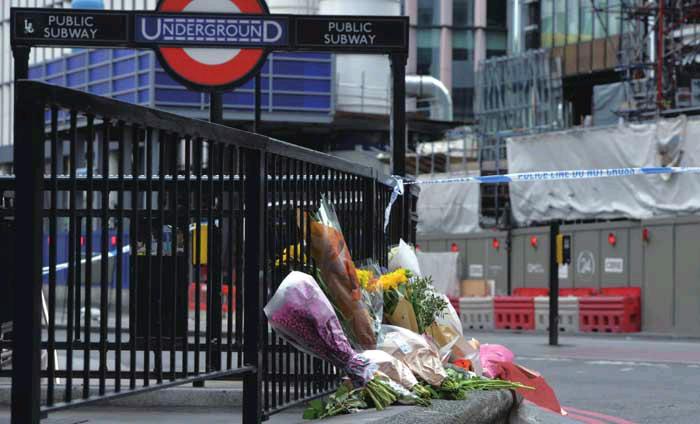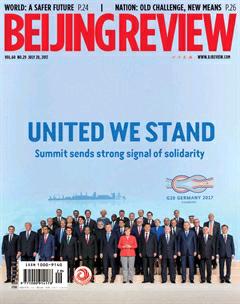Paying the Price?
By+Song+Luzheng
This is an election year for Europe. The UK and France have already gone to the polls, and Germany, the Netherlands and Italy will soon do likewise. While the public is worried about the rise of far-right parties, a spate of terrorist attacks has distracted peoples attention. This is especially so in the UK, where four terrorist attacks within four months have cast a shadow over the whole country.
The root causes
In the past few decades, some Western countries interfered with other nations internal affairs through military means, often in the name of protecting human rights and democracy. However, when chaos arises after the original power balance is broken, they walk away without providing a feasible solution, leaving many locals brewing hatred toward them.
For instance, led by the United States, the Western world has long sided with Israel, ignoring the basic sovereign rights and human rights of the Palestinians and thus sowing the seeds of hatred toward the West within the Islamic community. In 2003, in the name of destroying “weapons of mass destruction,” a U.S.-led coalition overthrew Saddam Husseins regime, leaving a political vacuum in Iraq, which created the conditions for the rise of various extreme political forces, particularly the “Islamic State (ISIS).”
Western countries have taken in a huge number of immigrants to fill labor force shortages during periods of economic growth. However, problems have gradually emerged. First, the recent economic slowdown has resulted in high unemployment. The Muslim community bears the brunt because of its high birth rate. In 2014, the British Muslim population had reached 2.8 million, almost double that of 10 years previously, but jobs didnt grow accordingly. Second, the progeny of first-generation immigrants are no longer content with the working and living conditions endured by their parents.
Extreme terrorism has thus won a number of misguided sympathizers. The recent terrorist attacks in the UK were mostly conducted by extremists born and raised in the country.
War against terrorism
Faced with mounting terror threats, Western governments respond by taking more military action abroad while expanding surveillance of domestic targets. France is reportedly planning to extend the de facto martial law that it has had in place for two years. However, these measures have proved useless even in removing the symptoms of terror attacks, let alone the root causes. Years have passed since the war against terror began, and instead of being curbed, terrorism is thriving. Even martial law is unable to shield France from terrorist attacks.
To eradicate terrorism requires a change in conventional thinking. First, Western governments need to get rid of the Cold War mentality and start to cooperate with Russia and Syria to end Syrias civil war as soon as possible and restore peace and order under President Bashar al-Assads regime. If their aim remains to overthrow Assad, the civil war will continue, and more refugees will be created in addition to those already in Europe and other Middle East nations. The prolonged war will have little impact on Russia, but is crucial to the security situation in Europe. Russia can afford to play for time, but Europe cannot.
The second step is stopping the spread of extremist ideas in Europe. This requires enhancing surveillance of radical websites and mosques, which are breeding grounds for extremism and terrorism. According to the U.S. think tank Gatestone Institute, 423 new mosques have sprouted up in the UK in the past few decades, adding pressure for surveillance.
Third, the Muslim communitys living standards need immediate improvement. For example, every family should have at least one employed person. If the whole family is out of work, living on welfare benefi ts, they are very likely to fall victim to extreme ideas. In the long run, a clear national integration policy is necessary, which means seeking to build the UK into a melting pot of different cultures.
However, this seems an unattainable goal for the UK at present. The impact of Brexit on its economy will gradually unfold. Before the Brexit referendum, Britain had just weathered the severe economic crisis of 2008. It is economically unprepared for the change.
It is currently impossible to end terror- ism once and for all, and the war against it is likely to continue for some time, with grim prospects.
Impact on the economy
Britains stock market, foreign exchange market and bond market react violently whenever a terrorist attack hits the country. The stock market tumbles, and the pound depreciates, while the price of bonds rises. As the fi nancial sector plays a very important role in its economy, the UK suffers more severely from terrorist attacks than other Western countries.
The attacks will have a big negative impact on Britains economic fundamentals. The fi rst to be affected is investment: Capital tends to seek safe places, and during a crisis period, security outweighs profi t margins.
Investment is one of the engines of economic growth, and declining investment will inevitably take a toll on the economy. Although Britain still saw an increase in foreign investment in 2016, it was just inertia and will be different once the effect of Brexit becomes apparent. Leaving the EU will lead to capital outflow and a drop in foreign investment in the UK. Terrorist attacks will only add to the problem.
The second impact will be the potential outfl ow of intellectuals. Although the outfl ow of talent has many causes such as high taxes and housing costs and the prospect of Brexit, terror attacks will make the decision easy.
The attacks will make it hard for Britain not only to attract overseas high-caliber personnel but also to retain its own talent. Statistics from the Organisation for Economic Co-operation and Development show that the UK population outflow has reached the highest level in 50 years, and more than one third of emigrants have received higher education. Another serious signal is that, according to the UK Offi ce for National Statistics, since the 2008 financial crisis, the number of young people aged 15-24 emigrating to other countries has increased by 8 percent. The point is, the British population is aging rapidly. In 2015, it reached an average age of 40 for the fi rst time, with more than 11.4 million people above the age of 65.
Third, tourism is heavily hit. Since the 1980s, developed countries have entered a post-industrialization period, with lots of manufacturing transferred to developing countries. Tertiary industry, which includes tourism, has become a bedrock sector for their national economies. However, tourism is very sensitive to lack of public security, so the media coverage and perceived danger of terror attacks will probably lead to a sharp decline in tourists. Countries mainly depen- dent on the service industry are therefore not as resilient as those whose economies center on manufacturing.
Fourth, internal confl icts have intensifi ed, kindling conflict between different civilizations. After several terrorist attacks, the UK also saw a non-Muslim Briton plow a van into a crowd of worshippers outside a London mosque. In recent years, mosques in France have seen frequent shootings and assaults on Muslims. Cases of attacks on Muslim students have also risen.
A vicious circle of conflict between different civilizations might form, coupled with further terrorist attacks. The internal rivalry between people with different religious beliefs will inevitably affect the overall development of society.
At present, many Western nations are faced with daunting challenges, from political rivalry to low public sector efficiency. Economic globalization, automation and fi nancialization have led to a shrinking middle class and an expanding rich-poor gap. Moreover, a sense of racial crisis is intensifying.

